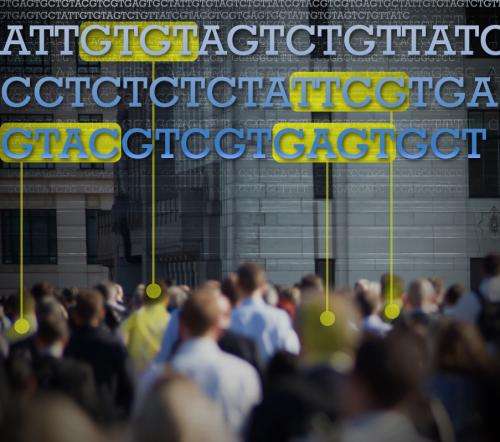December 30, 2014 report
Ten of the top medical research discoveries of 2014 on Medical Xpress

(Medical Xpress)—It was an exciting year in the medical research field, as teams across the world continued to strive for a deeper understanding of the human body and for ways to prevent or treat ailments. Some focused on aging or ways to prevent it, while others looked for ways to enhance what Mother Nature gave us naturally.
The geographic origin of AIDS is now known—A widely diverse team of researchers with members from the U.S. and several countries in Europe was able to piece together where, when and how the first instance of AIDS in humans occurred. Using statistical analysis, the team was able to pinpoint the original infection site as Kinshasa, the capital of what is now the Democratic Republic of Congo—sometime during the 1920s. The team has published their findings in the journal Science. The first human infection came courtesy of a chimpanzee, as has been suspected. The team's work illustrates how social change and transport methods contributed to the pandemic that began in the 1960s.
Cesarean section may cause epigenetic changes—A study conducted by a team of researchers at the Karolinska Institutet in Sweden revealed evidence that suggests delivering babies via cesarean section can result in changes made to the baby's stem cells. Such changes, the team found, can be blamed for an increased risk of immunological diseases such as asthma, diabetes type 1, celiac disease, etc. The team has published its findings in the American Journal of Obstetrics and Gynecology—it also reports that it remains unclear whether such epigenetic changes are lifelong or short-lived.
"Trigger" for stress processes discovered in the brain—A team of researchers working at the Center for Brain Research at MedUni in Vienna along with colleagues from the Karolinska Institutet in Sweden discovered an important factor related to stress—the protein secretagogin was found to work as a trigger in the brain by releasing the stress hormone CRH. The team has published its findings in the EMBO Journal. Prior research had shown that CRH is part of the process that leads to signaling in the pituitary gland and to other organs.
Researchers identify first steps in formation of pancreatic cancer—A team of bio-researchers working at the Mayo Clinic were able to identify the initial processes that lead to pancreatic cancer—a finding that could lead to therapies for preventing the cancer from getting started. The team has published its findings in the journal Cancer Discovery. The team discovered that the initial processes, which occur at the molecular level, came about due to the development of lesions, some of which morphed into cancerous growths.
Scientists locate homing signal in brain, explaining why some people are better navigators—Researchers working at University College London identified the part of the brain that is responsible for allowing people to know which direction to travel, given their current location and orientation. In a paper published in Current Biology, the team explains that the study found that the entorhinal region in the brain, which was already known to be responsible for orientation, is also responsible for our ability to navigate. Researchers found they were actually able to measure a person's sense of direction using fMRI scans.
Research shows seven-year-olds can think strategically—A trio of researchers working at the University of Minnesota conducted a study that involved testing children on thinking strategies and found evidence that suggests that kids as young as just six and a half years old are able to use strategies comparable to those of adults when playing games. The team published its results in Proceedings of the National Academy of Sciences finding that the children were able to use recursive thinking, and had an ability to infer what others were thinking based on incentives presented to them.
Scientists discover how to 'switch off' autoimmune diseases—A team of researchers working at the University of Bristol reported on a major breakthrough in finding a cure for autoimmune diseases such as multiple sclerosis. In a paper published in Nature Communications, the team describes finding a way to stop the immune system from attacking healthy tissue—by learning how the process of conversion from attacker to protector works. The process is currently going through clinical development by a biotechnology company affiliated with the university.
Researchers discover genetic marker behind stroke and cardiovascular disease—a team of researchers working at the University of Virginia announced that it had found a genetic variant tied to an increased risk of stroke and certain types of cardiovascular disease. In a paper published in the journal PLOS Genetics, the team described the study, which included analyzing the genomes of over 5000 people, and how it also led to findings related to metabolic pathways that play a role in many types of diseases.
Memory loss associated with Alzheimer's reversed for first time—A combined team of researchers with UCLA and the Buck Institute for Research on Aging reported that a 36-point therapeutic program they had developed had reduced signs of dementia in nine out of ten volunteer patients involved in the study. In a paper published in the journal Aging, the team describes the program and details the results they observed with patients that adhered to it over a three- to six-month trial period.
Human clinical trial of drug shown to completely reverse diabetes in human islets, mice—A team of researchers working at the University of Alabama announced that studies they had conducted testing the drug blood pressure medicine verapamil showed that it had completely eliminated any signs of diabetes in lab animals—that success has led to $2.1 million grant from Juvenile Diabetes Foundation. The team has not published the results yet, but will likely do so after test trials, which are scheduled to start sometime early next year.
To find more from a selection of the best medical research studies conducted this year, please visit: medicalxpress.com/2014-news/.
To learn about new discoveries this coming year, check out our site, Medical Xpress.
© 2014 Medical Xpress





















